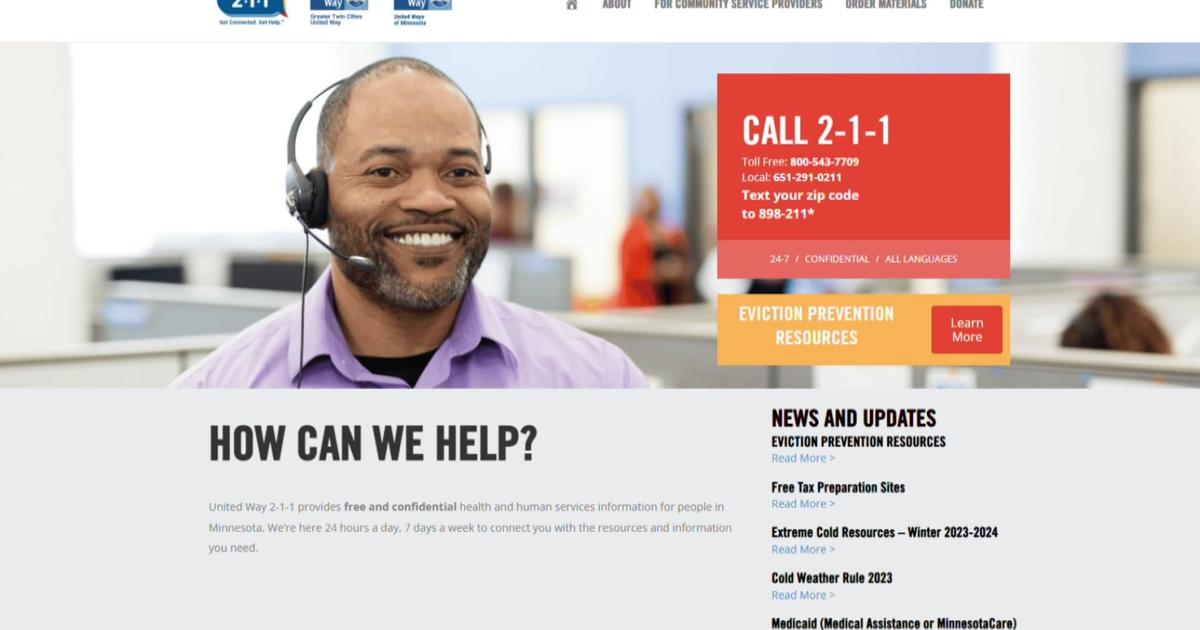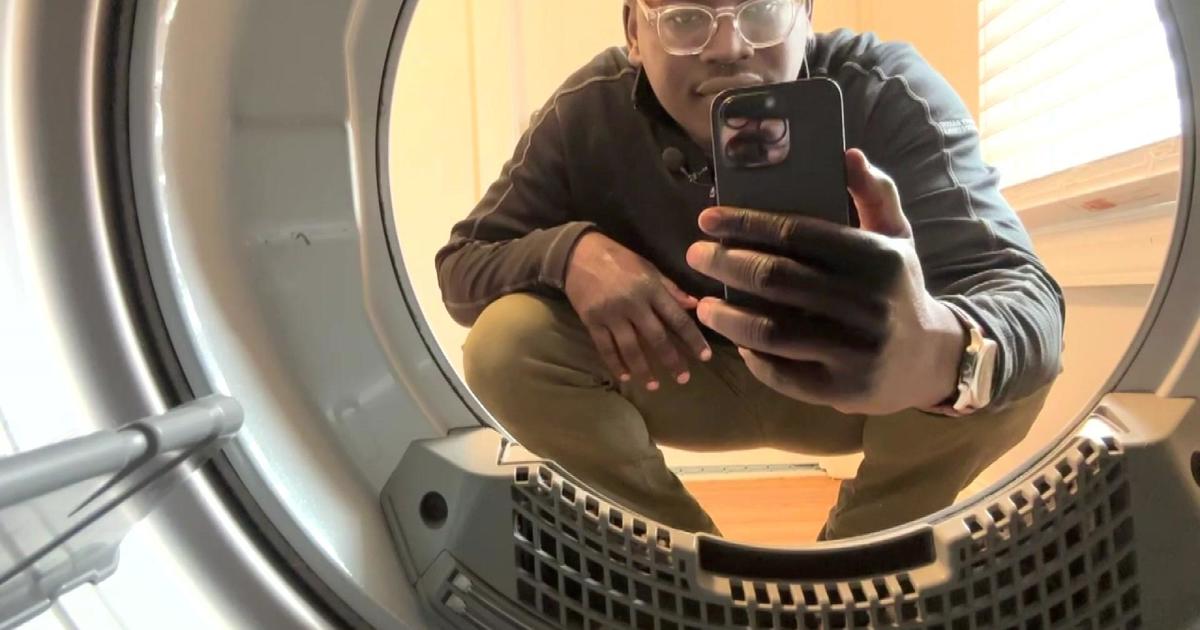WCCO Reveals Testing Results Of Popular CBD And Delta 8 Products
Originally published May 2
MINNEAPOLIS (WCCO) -- CBD products and stores have exploded across the state. Some carry other products that contain THC, like what's called Delta-8. The space was unregulated in the state until 2020. Now most of the products sold are legal.
But what's in them? WCCO tested 10 popular products at a lab recommended by the Department of Agriculture in February. The chemist found some discrepancies with what the label said versus what was inside. WCCO's Jennifer Mayerle learned some types of products are illegal in the state.
Taking cannabinoid products runs in the family. Linda Carpenter and her adult son Eric Troidl take CBD for a range of reasons.
"I took them mainly for sleep, I have restless leg," Troidl said.
"Like a cream rinse for the nerves," Carpenter said.
They ingest a variety of products. Linda adds it to cookies, and gives it to her cat. And she's tried Delta-8 for sleeping.
"Half of a gummy kind of threw us," Carpenter said.
They know the CBD space is now regulated in Minnesota. They say they research what they buy, but still wonder what's actually in the products.
"Some seem like they don't do anything and I'm wondering how much is actually in here, and some seem like they have a great effect," Troidl said.
WCCO asked Legend Technical Services to test 10 popular products, from CBD and Delta-8 gummies, to capsules, tinctures and flower. Emily Hoffman is a chemist with the accredited St. Paul lab.
"We've been testing hemp and cannabis products since 2015. We take the product and weigh out a certain amount, extract it in some type of solvent. From there we take a small amount of that extract and run it through our instrumentation, and it will give us the profile of what is in there," Hoffman said.
Overall, the testing found varying results.
"Some are high, some are low, some are over the legal limit, and some are missing compounds that they claim," Hoffman said.
Hoffman says a number of gummies had close to what was advertised, with some variation. The capsule was right on, a tincture had a little more CBD than listed, another had just under the advertised THC.
The state allows 0.3% Delta-9 THC. Companies with products containing intoxicating THC, too much Delta-9 THC, or missing ingredients responded.
The CBD Centers of Woodbury called the intoxicating THC an aberration, saying they don't sell intoxicating products, and eliminated the strain from the store.
Twin Cities Cannabis says the amount of Delta-9 over is within the standard deviation allowed. The Board of Pharmacy oversees CBD products. It calls it a gray area. The product also contains Delta-8. The company wants the BoP to clear up confusion surrounding what's allowed.
On the product missing an ingredient, the company questioned the testing, and later provided its own testing showing the ingredient.
Cody Wiberg is the executive director of the Board of Pharmacy.
"CBD products are regulated," Wiberg said. "They are legal as long as they meet certain testing and labeling requirements."
"Do we really know what's inside the products?" Mayerle asked.
"If you're asking maybe are there agencies, state agencies that are going out and routinely testing the products, the answer is no," Wiberg said.
He used to refer to CBD in the marketplace as the "Wild, Wild West."
"There's work to do on the regulation, there's no doubt about it," Wiberg said.
In the course of reporting this story some regulations changed. And Wiberg says Delta-8 products are actually prohibited in Minnesota, although there's no real enforcement.
"That law clearly says the substances have to be non-intoxicating, and Delta-8 THC is intoxicating," Wiberg said.
The Department of Agriculture oversees food, and told WCCO "Gummies containing CBD or THC are not legal to sell in Minnesota." It also added a lack of industry standards makes it difficult for consumers to know what they're buying.
Linda and Eric say they'll continue to use CBD.
"I seriously couldn't have done this interview [laughs]!" Carpenter said. "I took a little extra and I feel, I feel great."
And say they'll keep doing their due diligence when picking products.
"I think it's really neat that you guys did that testing on it. That was always something I wondered," Troidl said.
Gov. Tim Walz wants to create a new Cannabis Management Office. That would bring medical marijuana, CBD and other THC products all under one umbrella. The Board of Pharmacy thinks that's what's needed to better regulate these products.
Statement from The CBD Centers of Woodbury:
The testing from the State of Minnesota indicated that flower strain was less than .3% Delta 9 THC – naturally occurring in the plant. The range is actually up to .39% naturally occurring in hemp flower, as decarboxylation is considered. (The process of heating reduces total THC.)
Consuming flower in compliant ranges is non-intoxicating.
While we can't know what happened to the flower after it left our store, I don't assume malintent and your testing indicated an amount out of range. In the absence of manipulation, I concluded the batch from our grower must have had variations from plant to plant. We've since eliminated that strain from our store, along with any strain that has a potential to fall "close" to being out of compliance.
We do not offer Delta 8 products, or any product with Delta 9 THC levels above .3%.
That flower strain appears to be an aberration, and we took immediate action. The moment you shared that test result, we quarantined all hemp flower. We released a couple of the THC compliant strains from quarantine after the grower could show us a 3rd party lab test on the compliant batches offered.
Delta 8 is naturally occurring in the plant, but in very small quantities. Some companies add concentrates to flower to make it more potent. We don't carry any product with Delta 8 enhancements. We don't offer flower with any enhancements.
We rely on 3rd party testing for all of our products. Oils, topicals, gummies – those are all very consistent and the test results are very reliable.
In the case of flower, your testing indicates there may be natural variations from plant to plant that the State of MN average didn't catch and as such, we've removed hemp flower that is close to the boundary.
This whole episode is very disappointing. As I believe your experience in our shop would support, we make it very clear that our products are not intended to intoxicate, that our mission is to help people find relief through legal, compliant hemp products, and we don't take a recreational approach to the industry. To be included in this story by virtue of what appears to be a variation in the genetic/grow cycle of that raw plant flower runs counter to our goals.
Statement from Twin Cities Cannabis:
The first product was Delta-8 oil. Your test showed it slightly above 0.3% Delta-9 THC whereas our shows it at 0.3% Delta-9 THC. I stated that the variance between our COA's is within the standard deviation and will not affect dosing or effects. Your most recent email now states that this product is technically not allowed in its entirety and illegal as of March 16th by the Board of Pharmacy because it contains Delta-8 THC. Inversely, our contact at the capitol stated this morning that it is legal to manufacture, possess, and consume but not sell seemingly effective March 16th. Whereas another contact at the capitol states that it is federally legal to manufacture, possess, consume and sell, but the BoP would like to regulate it with a current bill being discussed in the House.
I'm really curious how the BoP can just unilaterally deviate from federal law without legislation and disseminated guidelines and expect compliance. As well as unilaterally determined what products are intoxicating.
At this point, we would like to see the MDA Food and Hemp Divisions and the BoP put forth a joint statement eliminating any and all confusion around this that they have created with their complete lack of communication and deviation from the federal level. Additionally, they should make positive contact with any and all retailers of these products advising them on the legal situation and ramifications of Delta-8 THC. As a manufacturer, the BoP position does not affect us. We can manufacture products and sell it to retailers and wholesalers, just not direct to the consumer. As a reseller to consumers, it directly affects revenues generated only within the state of Minnesota. Furthermore, it allows anyone to go online and order from an out-of-state provider or travel to another state and bring products back and consume them in public. Also, we could just relocate to another state and operate business as usual and sell to Minnesotans online.
The system in Minnesota is clearly broken and the government agencies tasked with these specific responsibilities are not in tune with the science. Or thinking through the logistics. Their position as of March 16th deviates from the federal farm bill and DOJ guidance that is well circulated and shared. You have done more in the last month communicating with the industry than the BoP has in the entirety of the program going back 4+ years.
We only sell to those 21 and older. 8/10 of our customers are retired and or have a chronic illness. Half of our customers are or were on the medical marijuana program. All these customers continue to utilize our products because of our ethical pricing, access, service, education and the improvement in their quality of life. This is not limited to the products in question, but a variety of perfectly legal cannabinoids. We cannot deny our customers this.
None of this would be an issue or even exist if the state expanded the medical marijuana program, implemented ethical guidelines by its operators and prevented price gouging. Or simply legalized cannabis and properly regulated it.
Thank you for taking the time on this story.
Statement from Minnesota Department of Agriculture:
The Minnesota Department of Agriculture's (MDA) Food & Feed Safety Division has licensing and regulatory authority for human and animal food handling including manufacturing, distribution, and retail sales. The MDA conducts routine, risk-based inspections of human and animal food facilities for food safety and sanitary standards, investigates illness outbreaks and food safety incidents, and conducts related enforcement activities. The MDA has authority over foods that are commonly marketed as containing hemp, CBD, and/or THC including gummies, beverages, and chocolates.
Just like any other food ingredient, products derived from hemp must be evaluated for safety prior to their use in food. The FDA is responsible for evaluating the available safety information and approving food ingredients when warranted. State law follows these federal regulations for food ingredients.
As CBD and THC have not been evaluated or approved by the FDA for safe use, CBD and THC are not approved ingredients in food and beverage products in Minnesota, including dietary supplements. It is illegal to sell food or beverages containing CBD and THC in Minnesota.
The MDA supports on-going legislative action to clarify the sale of processed hemp and cannabinoid products allowed for sale in Minnesota, and support research into the safe use of processed hemp and cannabinoid products.



